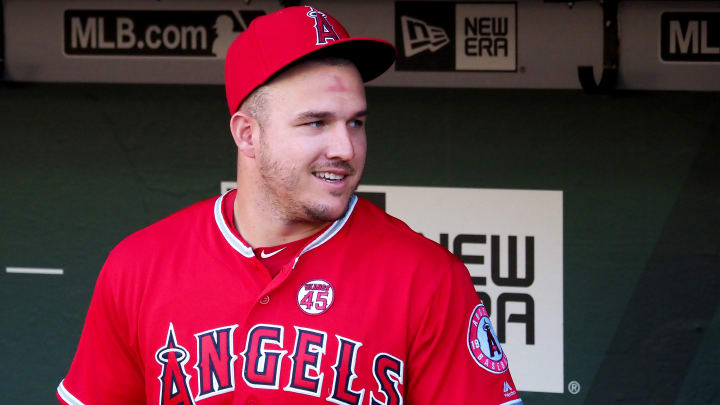Giving Thanks for All Baseball Has to Give—And Lose

Baseball’s recent headlines have been both unusually dark and unusually dizzying for this time of year.
Of course, that’s been primarily driven by the sign-stealing story out of Houston, in which details have been sliding out at a tense pace to rival any serialized drama. (The MLB investigation has grown to involve players; managers of multiple other clubs; 2018 and 2019 as well as 2017, including that year’s championship October; “Band-Aid like wearable stickers;” and more.) But there’s also been MLB’s proposal to contract 42 MiLB clubs, which caused a strong response from fans, players and Congress. And Rob Manfred trying to walk back comments from recent negotiations between MLB and the MLBPA, when he reportedly said “maybe Marvin Miller’s financial system doesn’t work anymore” and characterized the situation as “not going to be a deal where we pay you in economics to get labor peace,” which, of course, drew attention to the potential of labor conflict in 2022. Meanwhile, questions about the baseball have persisted, as it remains unclear exactly what happened to the ball during the postseason. Even the one ordinary November storyline—free-agent activity—has a slightly darker undertone. The White Sox’ and Braves’ moves are necessarily cast in a labor context as well as a baseball one: Can, as the commissioner would apparently say, Marvin Miller’s financial system still work? How functional will the rest of this year’s free-agent market be? Have the last two offseasons been anomalies or threats?
Which is all to say: unusually dark and dizzying.
If there’s any central theme here, it is one of a crisis of belief, or at least of a suitable situation for one. Can you believe that one of the best teams in history was really one of the best teams in history? How much should you believe that their success had to do with their, er, related audiovisual pursuits? Are you supposed to trust any of this—any of these games that you watch with your own eyes? Can you believe that MLB cares about MiLB? Can you believe that MLB cares about the minors’ players, towns, fans? Can you believe the baseball? (Can you believe in baseball?) Can you believe in Marvin Miller’s financial system? Can you believe that any of this is sustainable? Can you believe?
Even if you’re interested, for whatever reason, in a narrow definition of “baseball”—without particular attention to labor or economics or anything else outside the lines—these stories are hard to brush aside. These are all intimately concerned with the action on the field, to say nothing of the power dynamics and institutions and beliefs that shape it. (And, also, one of them is literally the baseball itself.) There is no reasonable way to shrink down the subject to avoid all of this. If you care about MLB, you have likely been frustrated, or infuriated, or at least a bit confused, this November.
This does not set a great foundation for the month’s annual practice of giving thanks, insofar as baseball is concerned. To ignore the collective effect of all recent headlines is to feel naïve at best and like a liar at worst. To be thankful for baseball is to miss the point. And, yet, at the same time: It’s exactly the point.
Because there’s so very much to be thankful for. There’s the simple fact of the players’ skill, collectively greater than anything that we’ve seen before. There’s Mike Trout. There are all the features of baseball that are the same as ever: the rhythms of a full season, the sound of the ball off the bat, the comfort of a late game on the radio. And there are all the features particular to this year: Max Muncy telling Madison Bumgarner to “go get it out of the ocean,” and this catch by Jackie Bradley, Jr., and this double play, and any of the wild season saviors in the Nationals’ run to the World Series. There’s everything in the story of the Grand Junction Chubs. There is the fact that baseball is so good at offering both the gentle sameness of routine and the joy of a new wonder every day. There’s baseball, in and of itself, underlying and overshadowing everything else here.
These virtues can feel very far from the previously mentioned headlines. But they’re not totally distinct from them. If anything, they’re deeply connected. For they’re a measure of just how much baseball has to give—which is, by any other ruler, just a measure of how much baseball has to lose.

Emma Baccellieri is a staff writer who focuses on baseball and women's sports for Sports Illustrated. She previously wrote for Baseball Prospectus and Deadspin, and has appeared on BBC News, PBS NewsHour and MLB Network. Baccellieri has been honored with multiple awards from the Society of American Baseball Research, including the SABR Analytics Conference Research Award in historical analysis (2022), McFarland-SABR Baseball Research Award (2020) and SABR Analytics Conference Research Award in contemporary commentary (2018). A graduate from Duke University, she’s also a member of the Baseball Writers Association of America.
Follow emmabaccellieri